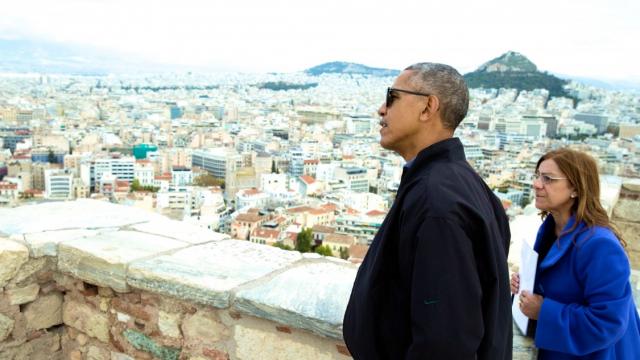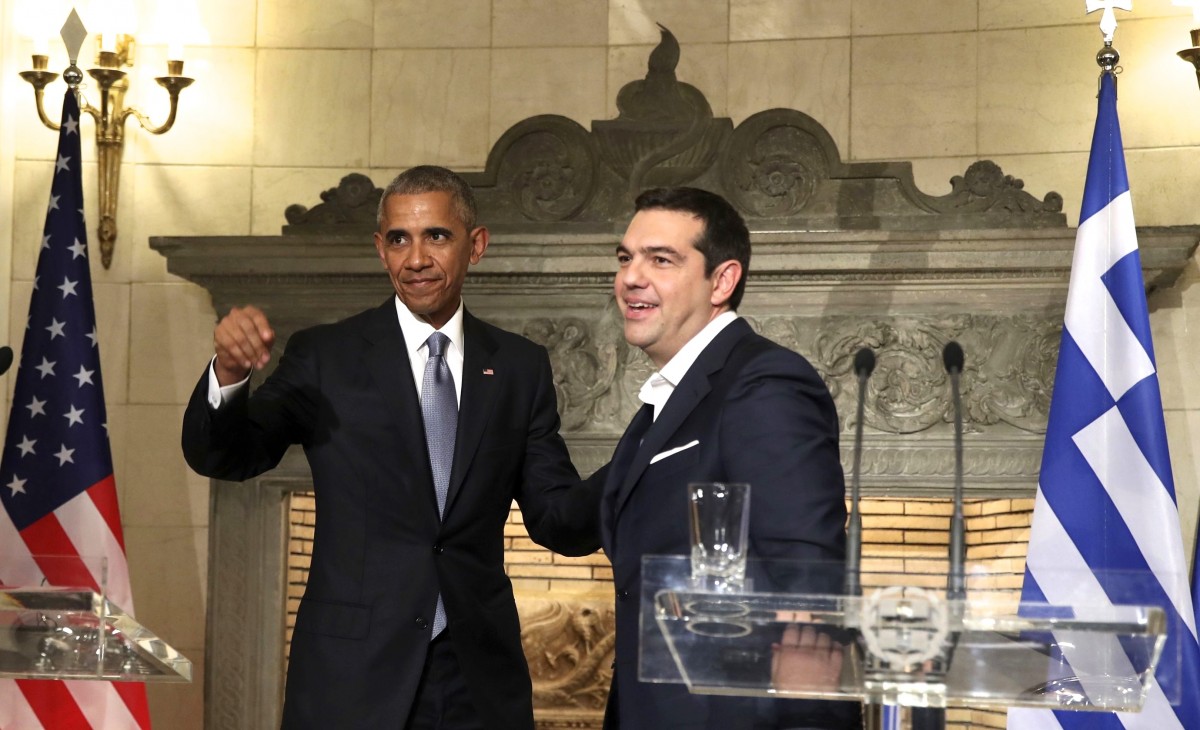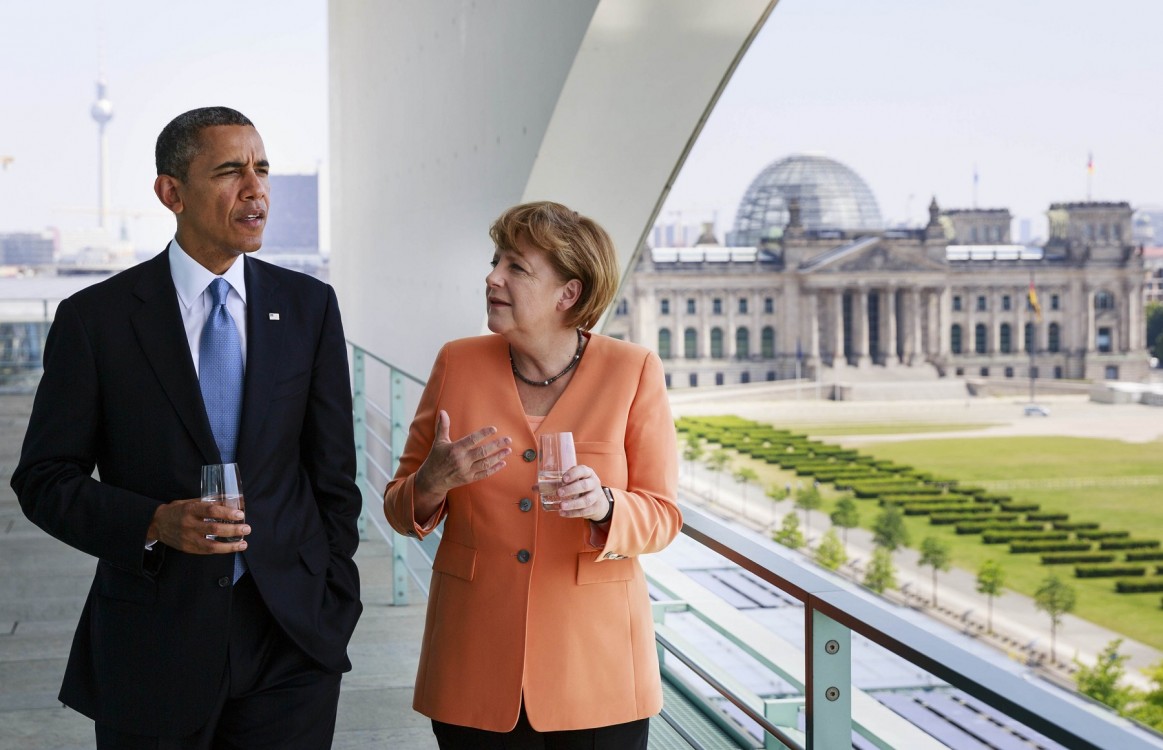
ATHENS – There is a seldom-used Aristophanean term in the Greek language, aptly named dimokolakas. It is reserved for speakers who tend to overshadow their shortcomings or their audience's failings with sweeping compliments and platitudes, making their speeches appear far grander and more laden with meaning when, in fact, they are only looking to appease a crowd that's desperately in need of some home truths.
Barack Obama's visits to Athens and Berlin last month seemed to fit the definition of the term. Both amounted to empty gestures of reassurance, and little more than a courtesy visit, by a U.S. president eking out the last leg of his term.
The Greek Approach
In Athens, Barack Obama's visit was treated with the usual histrionic reaction of overblown security theater as police sealed off large chunks of the city center and paralyzed the capital for almost three days. During his speech, the outgoing president praised democracy and the great contributions Greece had made to the Western world. He lauded the values of an involved citizenry and skimmed over the "tremendous sacrifices Greeks have made," going to far as to state that "Greece needs debt relief because people need hope" – a statement that rings truer now than ever in light of the IMF's recent debt sustainability report, which pleads with European authorities to allow an extension for Greece's loan payments.
According to the report, should Greece's payments not be extended to 2040 with a 20-year grace period, the country will be doomed to a prolonged austerity that could result in the country's debt overwhelming its GDP by nearly 300% in 2060.
These statements were quickly glossed over, however, as Obama moved on to incorporate the merits of his own presidency into the speech. During his 40 minutes on the podium, Obama made no attempt to hint at any U.S. intention to give Greece a leg up on the IMF negotiations, nor alluded to any ways the U.S. could actually allow Greece to rekindle its lost hope. Obama closed with the statement: "You don’t have to travel overseas, you can put roots right here in your home, in Greece, and succeed."
While his remarks did strike a chord in a country that is currently undergoing a brain drain on par with the mass diaspora of the 1960s, it did little to help the status – or ease the anxiety – of a generation of workers who are currently facing the prospect of a lifetime of economic quagmire in their place of birth.
One important reference Obama made was regarding philotimo: a Greek term that he interpreted as "love and respect and kindness for family and community and country." What's interesting is that his depiction is nowhere near the actual meaning of the term. For Greeks, philotimo is used to connote decency and integrity, two qualities desperately in short supply here of late. Even the former Greek Minister of Finance, Yianis Varoufakis, scoffed at Obama's Athens visit, saying: "His trip now I am sure is a very pleasant one, but it is completely irrelevant.”
The German Approach
The president's follow-up visit to Berlin seemed to have a much more explicit intent. Unlike his far-reaching speech in Athens, Obama's Berlin appearance came off as an unabashed endorsement of Chancellor Angela Merkel, for whom he went so far as to say: "Her commitment to looking out for the interests of the German people first, but recognizing that part of good leadership on behalf of the nation requires engaging the world as a whole... I think she's been outstanding."
While the gesture seemed to resonate deeply among the European media, one can't miss feeling that is was also somehow meaningless in light of Europe's changed political landscape – and Obama's inability to make good on his endorsement. While his statement may have played a part in Merkel's landslide CDU re-election victory, it almost immediately caused a spike for the far-right, anti-European AfD Party, which largely drew its support from those angry with the chancellor's handling of last year's refugee crisis.
After all, Euro-skepticism is holding fast – and gaining – on the Old Continent where many fringe political elements are on the rise, seizing on the refugee crisis and the recent approval of the CETA trade deal despite heavy public opposition. Among Obama's closing statements in Berlin was the warning: “That is why America cannot turn inward... that is why Europe cannot turn inward.”
Merkel's response reflected Obama's sentiment about international policy: "We have made progress, quite a lot of progress," she said. "They cannot be stopped, those negotiations. But we’ll keep what we have achieved so far, and I'm absolutely certain that one day we will come back to what we have achieved and build on it."
But growing isolationist feelings in the E.U. seem to push against the U.S. president's message, and more so with the unexpected election of Donald Trump. It now seems that the U.S. and E.U. are about to enter a new era in the history of their joint relations. Whether these revised relations will be anything more than superficial remains to be seen.
An important aspect of Obama's visit to Germany, which was largely downplayed by the media, was the people's reaction. Some Berliners commented that his presidential visits to Berlin were a breath of fresh air, considering that previous U.S. presidential visits came with the possibility of imminent nuclear confrontation. But Germans who worked for U.S. companies in the country mentioned that his policies often "went right past those in need."
In the end, the pomp and circumstance of Obama's farewell tour to Europe seemed to fall apart, revealing the trip as little more than a gesture of goodwill amid a rapidly changing global political climate, not to mention the planetary one. Perhaps we may choose not to look too closely on Obama's greater legacy once the 45th president's term begins.
3 WAYS TO SHOW YOUR SUPPORT
- Log in to post comments















